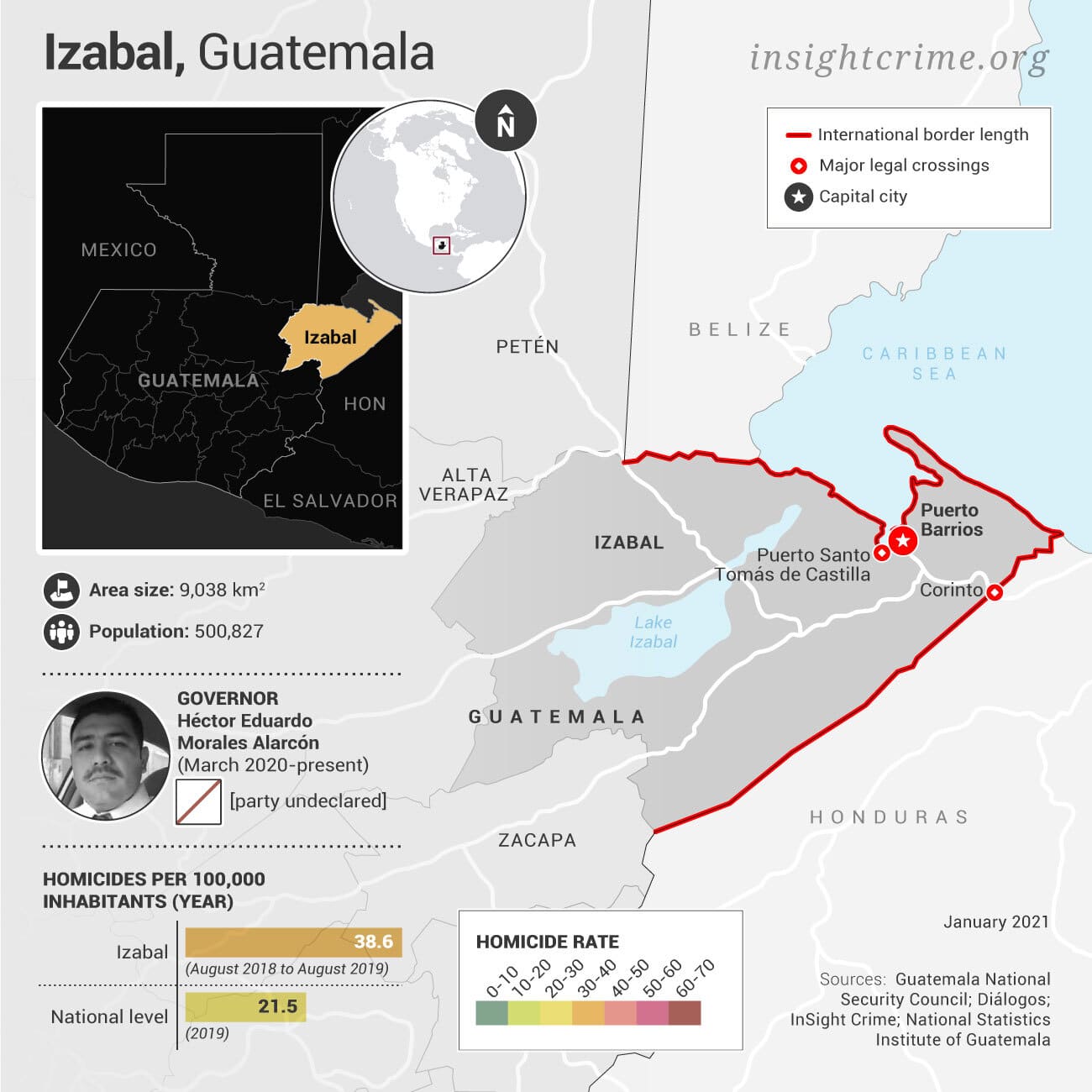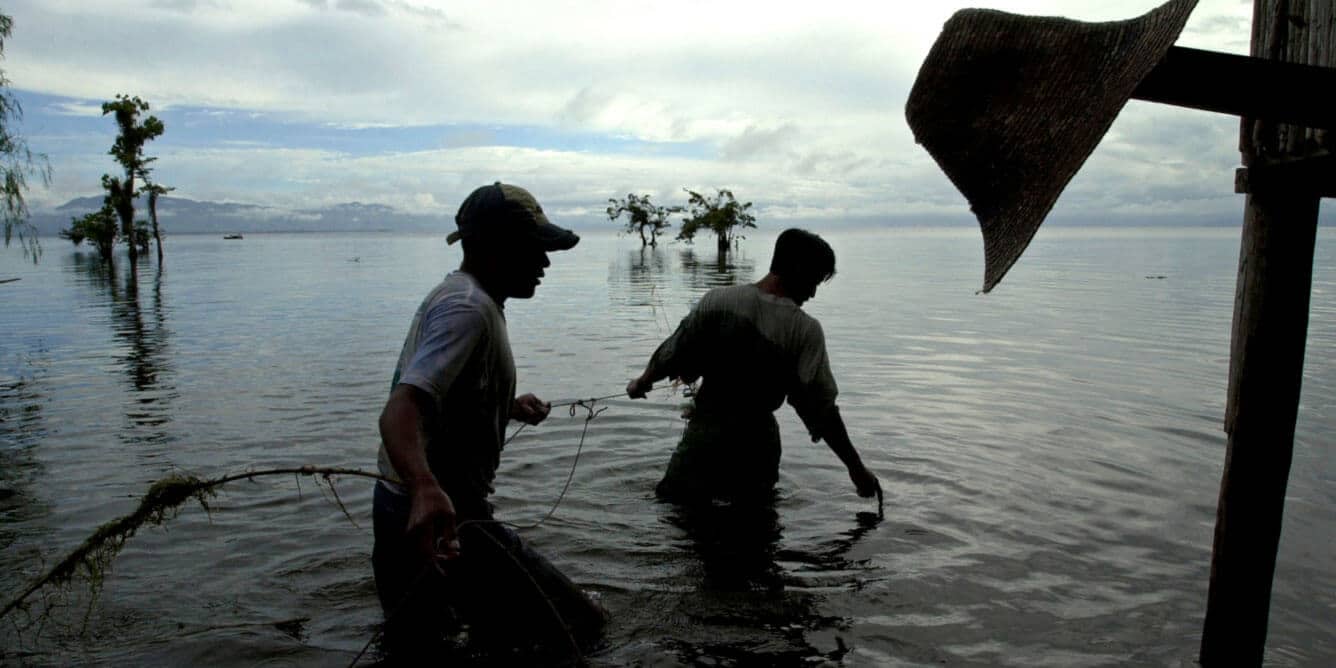Izabal is one of the most important transit hubs for cocaine being smuggled from Honduras into Guatemala by land, as well as for cocaine arriving by plane or sea from Colombia and Venezuela.
The department’s coastal location — and proximity to Honduras, Belize and Mexico — make the department an ideal center for human trafficking groups, particularly those involved in sex trafficking. Izabal also lies on an important route for migrants heading north through Central America.
Security deficiencies at Izabal’s main commercial port – Santo Tomás de Castilla – aids smuggling operations in the department.


Criminal Actors
Lorenzanas: The Lorenzanas are one of Guatemala’s traditional drug trafficking clans. They began in the neighboring department of Zacapa, but in the last two decades have expanded their criminal activities, above all drug trafficking, to various villages in Izabal. The patriarch of the group, Waldemar Lorenzana, was arrested in 2008 and again in 2011. He and two of his sons were later extradited to the United States in 2014 and 2015. Despite the leadership’s downfall, Waldemar’s other children and relatives took control of the business and the clan has remained one of the principal protagonists in the drug trade along the Guatemala-Honduras border, with a continuing presence in Izabal. However, the scope of the clan’s power has diminished due to the above-mentioned arrests and the emergence of other drug trafficking groups.
Mendozas: Based in the Morales municipality, the Mendozas have weathered a series of arrests to keep operating drug trafficking routes entering Izabal through the porous border with Honduras. The group’s influence extends to the department of Petén, in the north of Guatemala, home to various overland smuggling routes bound for Mexico. In Morales, the Mendozas can still influence municipal politics and the police. They also have a stake in the town’s formal commerce.
Corrupt politicians: The fragmentation of drug trafficking groups in Izabal has led to the formation of smaller groups, accompanied by the rise of local political actors seeking to take advantage of power vacuums and exert control over various criminal economies.
Criminal Economies
Arms Trafficking: Firearms are trafficked into Izabal from neighboring Honduras, with demand for illicit weapons partially driven by the presence of street gangs. There is also a strong presence of drug trafficking groups in the department, which are typically well-armed. This suggests the existence of at least a moderate black market for firearms in Izabal.
Cocaine: Izabal is one of the most important cocaine transit points in Guatemala. In 2019, authorities seized 6.9 metric tons of cocaine in the department, worth just over $92 million, as per price and seizure data provided by Guatemala’s antinarcotics police. Considering the strong presence of drug trafficking groups in Izabal and the likelihood that far more drugs pass through the department than declared seizures, cocaine trafficking appears to be a very lucrative criminal economy, reaching into the hundreds of millions of dollars.
Cannabis: Guatemalan police have detected small marijuana plantations, above all in mountainous areas in the department, such as Los Angeles and Livingston. For the most part, this production is destined for local consumption. In 2019, seizures of processed cannabis and crops had a combined value of $144,188.
Environmental Crime: There appears to be minimal timber trafficking in Izabal, given a lack of reported seizures.
Human Trafficking: In Puerto Barrios, human trafficking is a moderate criminal economy.
As both a port city and a hub for organized crime, the department’s capital houses multiple brothels, where some victims of trafficking are forced into prostitution. This includes women and girls from Guatemala, El Salvador, Honduras and Venezuela, among other countries. In other instances, indigenous minors are forced into unpaid labor in restaurants and corner shops selling tortillas.
Human Smuggling: In 2019, just over 1,000 Guatemalan migrants were returned to Izabal from the US, a percentage of those that made the trip. Given the price of hiring a smuggler from the area (roughly $10,000), this appears to be a lucrative criminal economy, reaching into the millions of dollars. Izabal bridges western Honduras and Guatemala’s northernmost department of Petén.
This is a common smuggling route for migrants passing through Central America, further driving this illicit trade. Departmental authorities have detected undocumented migrants from the Caribbean and Asia (China and Vietnam), many of whom arrive in South America and cross Izabal on the way to the US.
Mineral Resources: Illicit jade extraction and sale has gained traction in Izabal in recent years. Groups that traditionally engaged in drug trafficking have also entered the trade. The main market for jade is in Asia. In 2019, authorities seized 10 metric tons of jade in Izabal, worth an estimated $10 million, suggesting a very lucrative criminal economy, reaching into the tens of millions. In December 2019, InSight Crime published audio recordings that appeared to show Izabal’s former governor, Erick Bosbelí Martínez, talking about jade mining activity, though Bosbelí has denied any involvement in illicit mining activities.
Extortion: Izabal has a relatively high rate of reported extortion cases. Bus drivers are routinely targeted with extortion fees and death threats. In recent years, extortion rackets have expanded in the department to the increased sophistication of prison gangs and migrant flows that have bolstered the presence of Honduran and Salvadoran gangs in Puerto Barrios. Police blame these gangs for an increase in extortion in the city center and the deaths of nine public transport workers in late 2018 and early 2019, which led to roadblocks throughout the department to protest the violence.
Sources: This profile is based on two field trips to Izabal and research in Guatemala City where InSight Crime interviewed high-ranking officials in the Governor’s Office, military and police chiefs, diplomatic and intelligence sources specializing in drug trafficking, a former official of the International Commission against Impunity in Guatemala (Comisión Internacional Contra la Impunidad en Guatemala – CICIG), former national prosecutors with experience working drug cases, customs and former port officials, religious leaders, and local journalists, most of whom requested anonymity.
InSight Crime also drew on an Attorney General’s Office investigation into jade mining, in addition to information provided by the United Nations Office on Drugs and Crime (UNODC), the Guatemalan anti-narcotics police (Subdirección General de Análisis de Información Antinarcótica – SGAIA), the Guatemala National Security Council, the National Statistics Institute of Guatemala, Diágolos, and local press.

